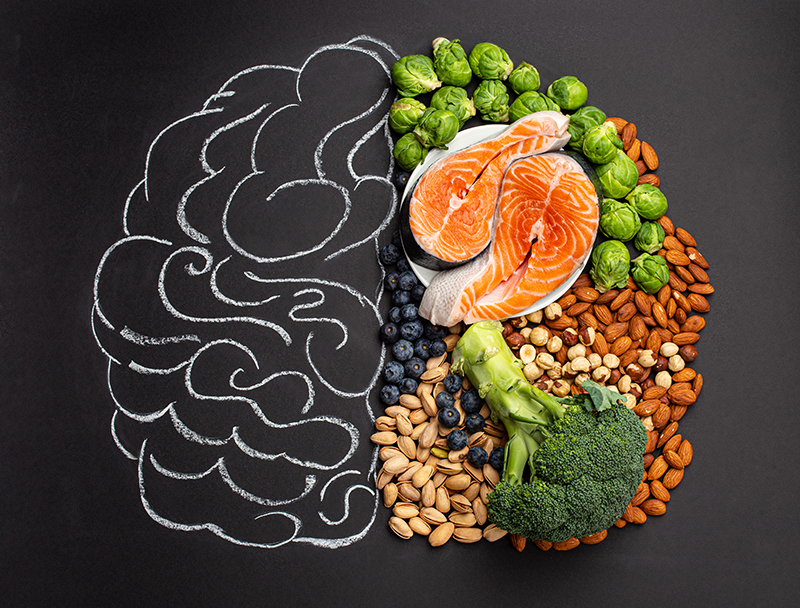As an older adult, your body may require more nutrients to maintain bone density, muscle mass, and energy levels. You should also think about eating foods that help slow the rate of potential cognitive decline. One of the best nutrition plans for this purpose is the MIND diet. Here is a brief guide to the MIND diet with information on the benefits, potential challenges, and recommended foods.
What Is the MIND Diet?
The acronym MIND stands for Mediterranean-DASH Intervention for Neurodegenerative Delay. Scientists borrowed from both the Mediterranean diet and the DASH diet to design the MIND diet. The Mediterranean diet may reduce the risk of diabetes and heart disease while the DASH diet may lessen hypertension. The MIND diet uses the positive impacts of both to focus on brain health.
The researchers who initially promoted the MIND diet wanted to expand on the framework of healthy eating and preventative nutritional care for older adults. This diet identifies foods that are good for brain function and foods that you need to avoid and also recommends serving sizes. Similar to the Mediterranean and DASH diets, the MIND diet features mostly plant-based foods, whole foods, and healthy fats such as olive oil.

Benefits of the MIND Diet
Following the MIND Diet offers many benefits, including the possibility of:
- Improved brain health
- Reduced risk of Alzheimer’s disease and dementia
- Healthy blood pressure and heart support
- Reduced risk of Parkinson’s disease
- Reduced risk of stroke
- Reduced inflammation
- Improved weight management
- Longer lifespan
- Reduced rate of depression
Every person’s needs are slightly different, so discuss any questions and concerns with your doctor and a licensed nutritionist before you make radical changes. Remember that diet plays a major role in health, but it is still only one part of the larger picture. If you’re worried that you may have a higher genetic risk of early-onset Alzheimer’s or dementia, schedule an appointment with a neurologist to learn more and get an assessment.
The MIND Diet Pros and Cons
Like any major life change, transitioning to the MIND diet can be challenging. The MIND diet pros and cons are worth considering.
The positive things you can expect to experience while following the MIND diet largely relate to better health outcomes, such as the ones listed above. Because this diet centers on whole foods, you will likely feel better in as little as a few weeks. You may experience improved gut health, more regular bowel movements, higher energy levels, and better health biomarkers if you stick with the diet for more than a year.
There are no negative health effects associated with the MIND diet, but there are some potential pitfalls. If you don’t usually cook your own food or eat out often, you may find it challenging to switch to the MIND diet. You will need to review meal plan ideas and read menus thoroughly to assess if common dishes fit within the guidelines.
While the MIND diet doesn’t emphasize the importance of exercise to overall health, physical activity is just as critical as what you eat. So even as you adjust your nutritional plan to align with the MIND diet guidelines, stay active by walking, swimming, bicycling, going to the gym, or working out at home.
The MIND Diet Food and Serving Guidelines
You won’t feel limited in your food choices when you follow the MIND diet because you can eat a wide variety of delicious, healthy foods. This nutritional plan also gives advice about how frequently you should eat certain foods. The daily recommendations suggest eating:
- Three servings of whole grains
- One serving of vegetables
Throughout the week, you should be trying to eat:
- Six or more servings of leafy greens
- Two or more servings of berries
- Five or more servings of nuts
- Four or more servings of beans and legumes
- One or more meals with fish
- Two or more meals with poultry
If you’re wondering what type of oil or fat you should cook with and add to your meals, the MIND diet recommends choosing olive oil because it is high in healthy fats.
The five types of foods you need to avoid to ensure healthy brain function are:
- Sugar, including pastries, excess fruit, and dessert items
- Red meat, including beef, pork, sausages, etc.
- Fried foods, including many fast food items
- Cheese, butter, and margarine
Experts advise avoiding alcohol if you’re trying to prevent dementia. Some research suggests that one glass of wine per week is not detrimental, but you have to evaluate the risks according to your health concerns.

Common Questions About the MIND Diet
You may have noticed that the MIND diet doesn’t address everyday foods such as eggs, milk, and more. Here are the answers to the most common questions people ask about the MIND diet.
Can You Eat Eggs on the MIND Diet?
Eggs are a great source of protein, and you can eat them while following the MIND diet. However, you should avoid adding butter, cheese, or other condiments.
Can You Drink Milk on the MIND Diet?
If you’re a big milk drinker, you should reduce your consumption for this diet. The MIND diet recommends only having a few servings of dairy per week.
Can You Eat Peanut Butter on the MIND Diet?
You can and should eat peanut butter to support your brain health. Peanuts are high in fiber and protein. However, always choose a natural peanut butter that doesn’t have any added sugar, trans fat, or hydrogenated oil.
Can You Eat Potatoes on the MIND Diet?
Common russet potatoes contain little nutritional value, and you should limit how often you eat them. Instead, go with sweet potatoes, parsnips, and other root vegetables.
Find Support To Transition to the MIND Diet
Wanting to protect your mind as you age is natural. The MIND diet is effective in improving health outcomes and supporting brain health in older adults. It provides good guidelines for what to eat, what to avoid, and how many servings of recommended foods you should aim for. If you’re wondering whether it’s the right time to transition to assisted living to receive support with cooking and daily tasks, take our free assessment today.




















